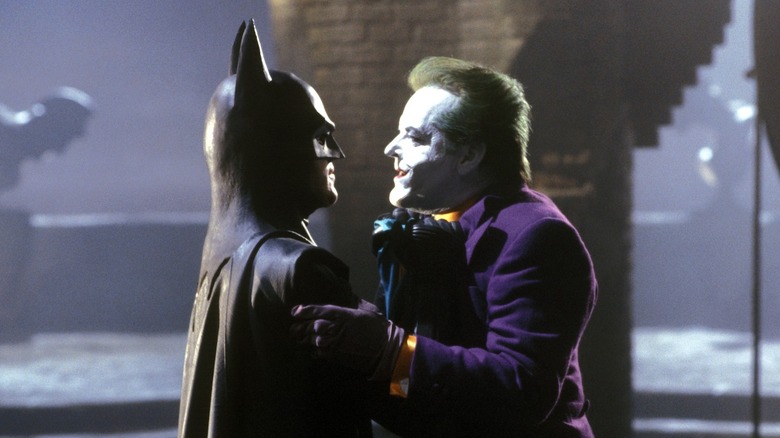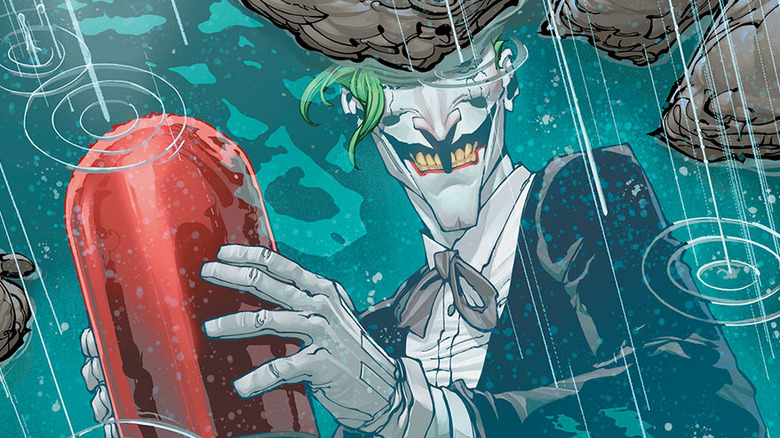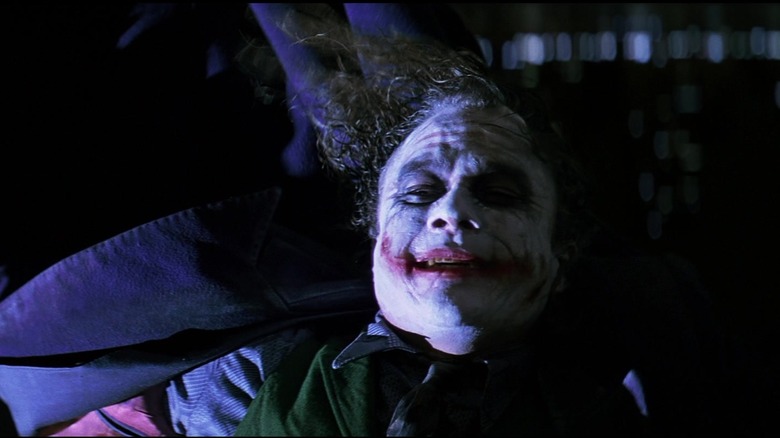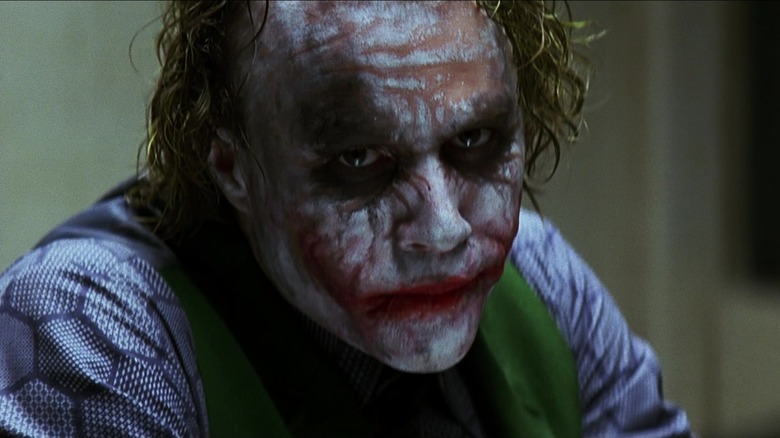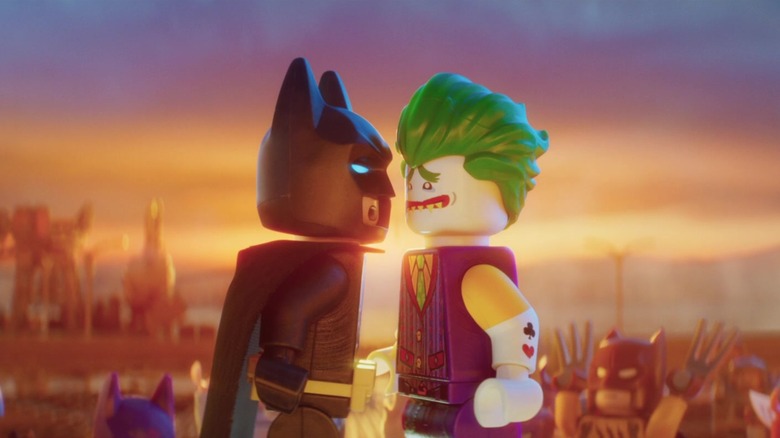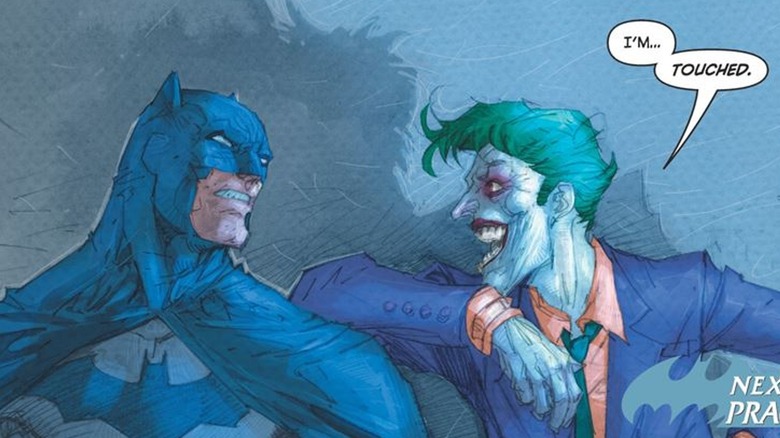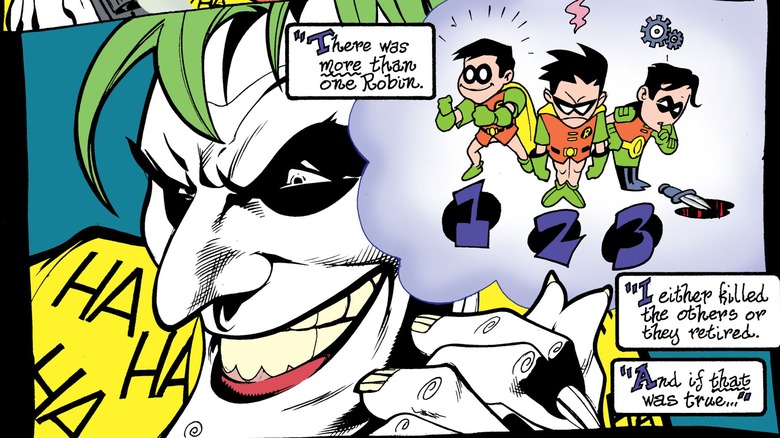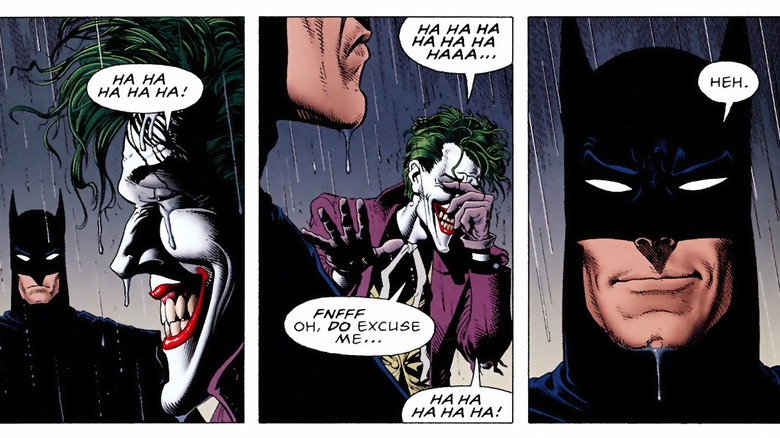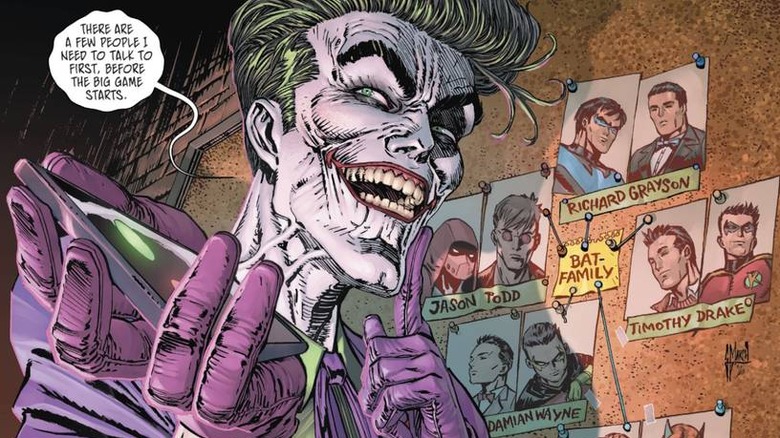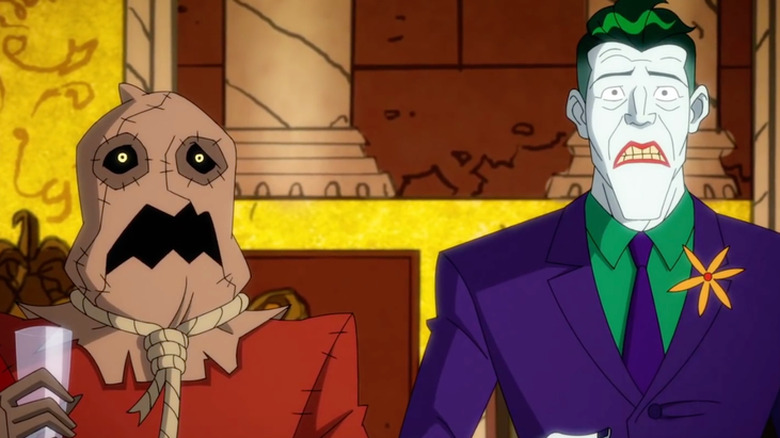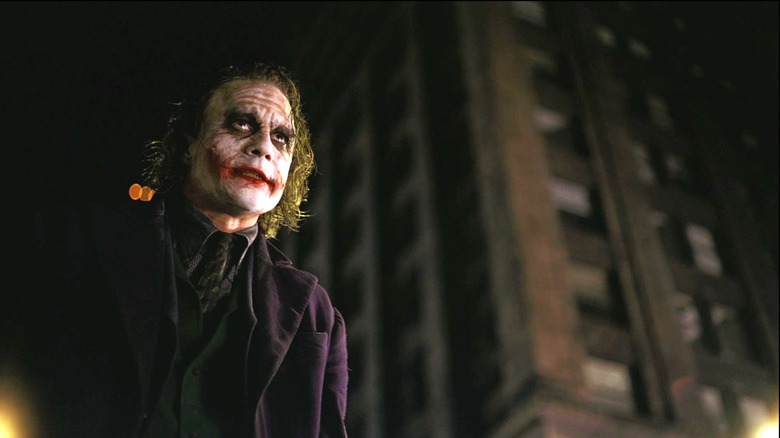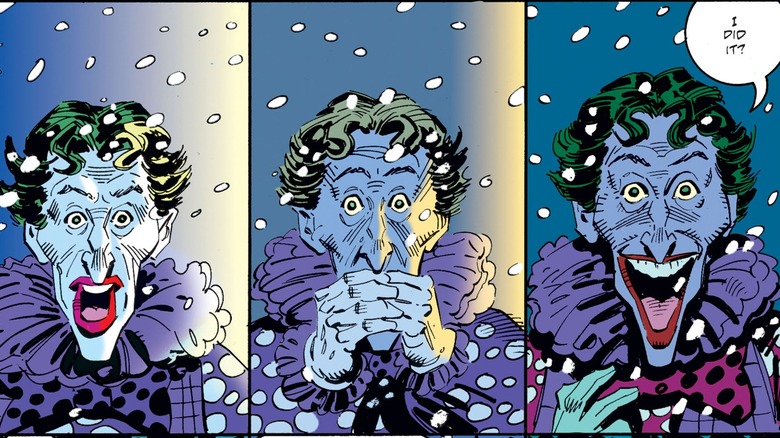The Truth About Batman And The Joker's Relationship Explained
Although Batman and Robin have always been called the Dynamic Duo, the relationship between Batman and his biggest nemesis, the Joker, is arguably way more dynamic. Batman and the Joker have been clashing for decades (the pair celebrated their 80th anniversary in 2020), and their relationship is ... complicated, to say the least. There's not exactly a single, definitive story behind their dynamic (the Joker prefers it to be multiple-choice), but there are definitely some common threads in every Batman and Joker story that define their relationship.
We're here to answer all your burning questions about the Caped Crusader and the Clown Prince of Crime, such as why Batman will never kill the Joker or why the Joker will never expose Batman's secret identity. (And yes, whether or not the Joker loves Batman.) Here's everything you need to know about these eternally codependent arch-enemies.
Batman may have created the Joker
If you're wondering how the Joker became so sick and twisted, it's possible that Batman may be partly to blame. Depending on whether or not you believe the version of the Joker's backstory shown in "Batman: The Killing Joke," Batman was chasing him when he fell into that fateful vat of chemicals.
In a less literal sense, Batman's approach to crime-fighting may have planted the seeds for the Joker. At the end of "Batman Begins," Jim Gordon (Gary Oldman) warns Batman (Christian Bale) that by taking up the cowl, he may have only escalated Gotham's crime situation. "We start carrying semi-automatics, they buy automatics," explains Gordon. "We start wearing kevlar, they buy armor-piercing rounds." And Gordon points out that, as soon as Batman started fighting crime in costume, another person began imitating his same theatrical style: the Joker.
Of course, other fans argue that the Joker would exist with or without Batman. Just look at the 2019 movie "Joker," in which Arthur Fleck (Joaquin Phoenix) becomes Joker even though Batman doesn't yet exist in his world. If Batman doesn't make him fall into the vat, it would be someone else, whether the police or the mob. And in that scenario, the Joker would declare that person his nemesis instead. It might be more accurate to say that Gotham's crime, corruption, and overall lack of empathy create the Joker — just as these same conditions orphan Bruce Wayne and create Batman.
Batman could never kill the Joker
No matter how many times the Joker escapes Arkham Asylum, Batman will never kill him. In fact, Batman has even saved Joker's life countless times, because he doesn't want the Joker's blood on his hands. It's a rule Batman must always follow, and the one rule that separates him from the criminals he catches. Batman knows that stooping to the Joker's level would mean giving his archenemy exactly what he wants. More importantly, Batman is afraid of what he might do if he breaks his "one rule." He's convinced that this rule is the only thing that keeps him from unleashing his savage side.
The short comic "Scars" from "Batman Noir" offers another possible explanation for why he always lets the Joker live. "Do you want to know what power is? Real power?" says Batman. "It's not ending a life, it's saving it. It's looking in someone's eyes and seeing that spark of recognition, that instant they realize something they'll never forget ... they owe you." This could mean that Batman feels that showing mercy is its own reward — or it could mean he gets a creepy sort of kick in knowing that the Joker owes him his life.
Of course, we would be remiss not to mention the most important reason why Batman won't kill the Joker: because the story must keep going. The Joker is popular, and he sells comics, so why would DC Comics throw that away?
Batman and the Joker need each other
Although he has no qualms about mass murder, the Joker has no intention of killing Batman. In "The Dark Knight," the Joker (Heath Ledger) declares, "I don't want to kill you. What would I do without you?" Everything the Joker does, he does to provoke Batman, and with Batman dead, the game would be over. There's no one else powerful enough (and broken enough) to be his nemesis.
And though he'll never admit it, Batman needs the Joker, too. For Batman, the Joker serves as a constant reminder of why he fights and marks the line that Batman dare not cross. As well, Batman uses the Joker as an excuse to keep up his vigilante lifestyle, because he wouldn't know what to do with himself otherwise. For instance, after Batman retires in "Batman: The Dark Knight Returns," he fills his days with competitive auto racing and watching "The Mark of Zorro," but none of these scratch the same itch as crime-fighting. Robert Pattinson, who portrayed the Caped Crusader in "The Batman," insisted in an interview with GQ that for Batman, fighting crime is "almost like a drug addiction." And without the Clown Prince of Crime, he could no longer get his fix.
The Joker sums it up perfectly in "Batman: The Clown at Midnight." He says, "You can't kill me without becoming like me! I can't kill you without losing the only human being who can keep up with me! Isn't it ironic?!"
The Joker is infatuated with Batman
Although it varies from storyline to storyline, there is plenty of undeniable evidence that the Joker is in love with Batman. Throughout his history, the Joker has been encoded as (or confirmed outright as) queer, constantly making sexually-charged remarks in his banter with Batman in the comics. You'll also notice that in the famous interrogation scene from "The Dark Knight," the Joker quotes a line from "Jerry Maguire" – "you complete me" — with obvious romantic connotations.
The video game "Batman: The Telltale Series" shows the Joker admitting he was an idiot to fall for Batman, while in "Catwoman Vol. 3: Death of the Family," Catwoman guesses that the Joker loves Batman, and the Joker openly acknowledges it. Meanwhile, Harley Quinn has realized on numerous occasions why the Joker never seems to return her feelings: because Joker's one true love is Batman.
Ironically, the movie adaptation that most directly acknowledges this is the PG-rated "Lego Batman Movie." Although the movie never officially says that Joker (Zach Galifianakis) has a crush on Batman (Will Arnett), it's all but confirmed by the queer-encoding sprinkled throughout the movie, from Joker's jealousy of Superman to the way he applies a fresh coat of lipstick before speaking with his nemesis. When Joker and Batman say "I hate you" to each other at the end of the movie, it's clear what they really mean.
Batman and the Joker have sometimes worked together
You'd be surprised how often the Caped Crusader and the Clown Prince of Crime have teamed up. For instance, in "Justice Leagues: The Justice League or Arkham," Batman decides to break some supervillains out of Arkham Asylum (including his old pal the Joker) to enlist their help. Meanwhile, the video game "Batman: The Telltale Series" introduces John Doe, the man who will become the Joker, and the game features him and Batman fighting side by side. (Obviously, their partnership doesn't last.) In "Batman: Europa," these arch-enemies form a grudging alliance after they are both infected with the Colossus Virus and traverse Europe in search of a cure. The cure, they discover, is hidden in each other's blood all along, a revelation neither one seems pleased about.
Perhaps most memorably, Batman and the Joker work together in the video game "Batman: Arkham City." Once again, it's a lethal virus that brings them together; when the Joker becomes infected with the Titan Disease and successfully transmits the virus to Batman, the Caped Crusader has no choice but to find a cure for both of them. He does, but not in time to save the Joker. You can tell Batman is shaken by this, because he carries the Joker's lifeless body the same way he carried Robin's body in "Batman: A Death in the Family."
The Joker hates Robin
The Joker absolutely loathes Robin – arguably even more than he loathes Batman. In fact, the Joker has been known to shoot robins perched on a fence post because they remind him of Batman's sidekick.
Nothing better exemplifies the Joker's hatred of Robin than when he brutally murders Jason Todd in "Batman: A Death in the Family." In later storylines, when Jason comes back from the dead and begins fighting crime as the Red Hood, the Joker is infuriated. Not just because the Joker previously wore the mantle of the Red Hood, but also because the Joker hoped torturing Jason would scar him forever. Instead, the Red Hood is a living, breathing reminder that the Joker failed to break Robin (and by extension, Batman).
But out of all the Robins, it is perhaps Tim Drake he loathes the most. In "Robin" #85, the Joker complains to his therapist about the various boys who wore the mantle of Robin, insisting that Tim is insufferable. Tim is the only one who can foil the Joker's plans without any help from Batman. Naturally, the Joker doesn't want that. The whole point of his plans is so that he can cross swords with Batman, and Robin is depriving him of precious time with the Bat. Of course, the Joker is frustrated by Robin no matter who wears the mask — because so long as Batman has a partner, the Joker can never truly isolate Batman and mess with his mind.
Batman and the Joker are more alike than you think
Alan Moore, author of the classic comic book "Batman: The Killing Joke," once told CBR, "Batman and the Joker are mirror images of each other." Studying these two characters, it's easy to see why.
The reason why Batman and the Joker are able to anticipate each other's moves so often is because they think so much alike. Both Batman and the Joker's romantic relationships are in shambles as well for the exact same reason. Both Catwoman and Harley realize the same thing about their lovers – Batman never gives Catwoman his full attention because he can't stop thinking about the Joker, and the same goes for the Joker and Harley. Even their mannerisms are identical. If you pay close attention to the party scene from "The Dark Knight," both Batman and the Joker dump their drinks in the same way.
Most importantly, both are shaped by a traumatic event that completely transforms their worldview (even if the Joker is coy about which version of his backstory is actually true). In "Batman: The Killing Joke," the Joker tells Batman, "There's no difference between me and everyone else. All it takes is one bad day to reduce the sanest man alive to lunacy," and he insinuates that Batman's "one bad day" (the death of his parents) may have already pushed him over the brink. Knowing that this comic ends with Batman and the Joker both laughing at the same joke, it's clear the line that separates them is thin indeed.
Does the Joker know Batman's secret identity?
Is the Joker one of a number of characters who know Batman's secret identity? It certainly seems like the Joker would be smart enough to connect the dots, "Death of the Family" is littered with hints that the Joker knows exactly who Batman is: In this comic storyline, the Joker breaks into Wayne Manor and attacks Alfred. How else could he know this would hurt Batman, unless he knew that Batman was none other than Bruce Wayne? Later, Batman speculates that the Joker may have known ever since their first battle. The Caped Crusader recalls that after that initial confrontation, he found the Joker's calling card (a Joker playing card, of course) in the Batcave. And if the Joker had been there, then he could have easily discovered it was connected to Wayne Manor. Coincidence? We think not.
Perhaps the biggest clue of all is hidden in the Joker's subconscious. In "Knight Terrors: The Joker," the clown is trapped in his own nightmare — a nightmare where Batman dies and the Joker has nobody left to fight. In this nightmare, the Joker keeps Batman's corpse in his closet, and yet Bruce Wayne is still alive, because as far as the Joker is concerned, Bruce and Batman are two separate people.
Of course, it may simply be that the Joker is only concerned with Bruce Wayne's alter ego, which means he knows Batman's secret identity but doesn't care. Or maybe he doesn't care to know.
The Joker doesn't want to expose Batman's secret identity
Throughout comics history, Batman has done some pretty bizarre things to keep his identity secret, but even more bizarre is that the Joker has repeatedly tried to protect this secret as well.
Clearly the Joker doesn't want to know who is underneath the mask. For instance, in the video game "Batman: Arkham City," he stops Harley Quinn from lifting the mask, telling her, "Why spoil the fun?" Meanwhile, in the TV series "Harley Quinn," the Scarecrow (Rahul Kohli) actually does unmask Batman, hoping to impress the Joker (Alan Tudyk). Instead, the Joker is outraged — and starts to sink into depression, knowing that his relationship with Batman will never be the same again. "Half the fun of our relationship was the mystery!" he cries.
Even when he knows who Batman is, the Joker would never expose this secret to the world. Time and time again, the Joker has taken great lengths to prevent anyone from knowing Batman's secret identity. In an episode of "The Batman" animated series, supervillains Wrath and Scorn threaten to expose Batman's secret identity, but the Joker uses laughing gas to make sure they stay silent. And in "Batman: Three Jokers" #3, one version of the Joker announces that he knows Batman's secret identity — and that he will take that secret with him to the grave. "The world can never know your true name," the Joker declares. "You might stop doing this if I do." For the Joker, Batman is far more fun when he's anonymous.
The Joker is willing to die to break Batman
While Batman can't bring himself to kill the Joker, the Joker wants desperately to see Batman cross that line — even if he pays with his own life. Case in point: just look at the iconic scene from "The Dark Knight" where Batman and the Joker play a game of chicken. As Batman charges the Joker head-on in his motorcycle, Joker stands his ground, daring Batman to go all the way. "I want ya to do it, I want ya to do it," he mutters under his breath. "Come on, hit me." Naturally, Batman can't do it, and the Joker is visibly disappointed.
When the Joker can't make Batman kill him, he settles for the next best thing: killing himself. In the comic "Batman: The Dark Knight Returns," Batman captures the Joker, but not before paralyzing him from the neck down. The Joker is incredulous that Batman won't just finish the job and put an end to the Clown Prince of Crime once and for all. Knowing that Batman will never cross that line on his own, the Joker twists his own neck in a way that proves fatal – thus robbing Batman of the choice (and conveniently framing Batman for his murder). This isn't the first time — or the last — that the Joker dies in the comics, but it's arguably the most haunting, because it shows the Joker can win even in death.
What would Batman and the Joker do without each other?
Several stories have explored what Batman would do without the Joker (or vice versa). For instance, after the Joker dies in the video game "Batman: Arkham City," its sequel "Batman: Arkham Knight" shows that Batman is still haunted by hallucinations of his nemesis. Batman can only escape the Joker's influence once he locks up the Joker inside his mind.
On the flip side, Joker would have no purpose without Batman. In the short comic "Killing the Batman" from "The Joker 80th Anniversary 100-Page Super Spectacular," the Joker watches all of Gotham City come together at Batman's funeral, realizing that he has deprived himself of his greatest enemy. The Joker wonders, "What have I done? And what the hell do I do now?" Likewise, "Knight Terrors: The Joker" imagines a scenario in which Batman dies in the most anticlimactic way possible — and the Joker can't even take credit for it. The Clown Prince of Crime must get a desk job and try to find a new purpose in his life, but he can't let go — literally, since he keeps Batman's rotting body in his closet.
In "Batman: Going Sane," the Joker mistakenly believes Batman is dead. Seeing no reason to keep up his life of crime, he instead pursues a normal existence. With Batman out of the picture, the Joker finds love and might actually be reformed. Only when Batman returns does the Joker reemerge — because of course one can't exist without the other.
